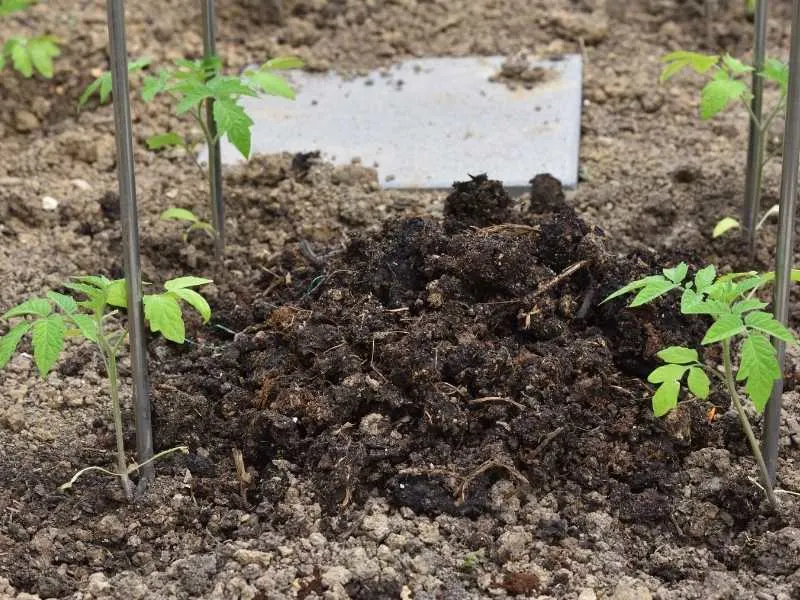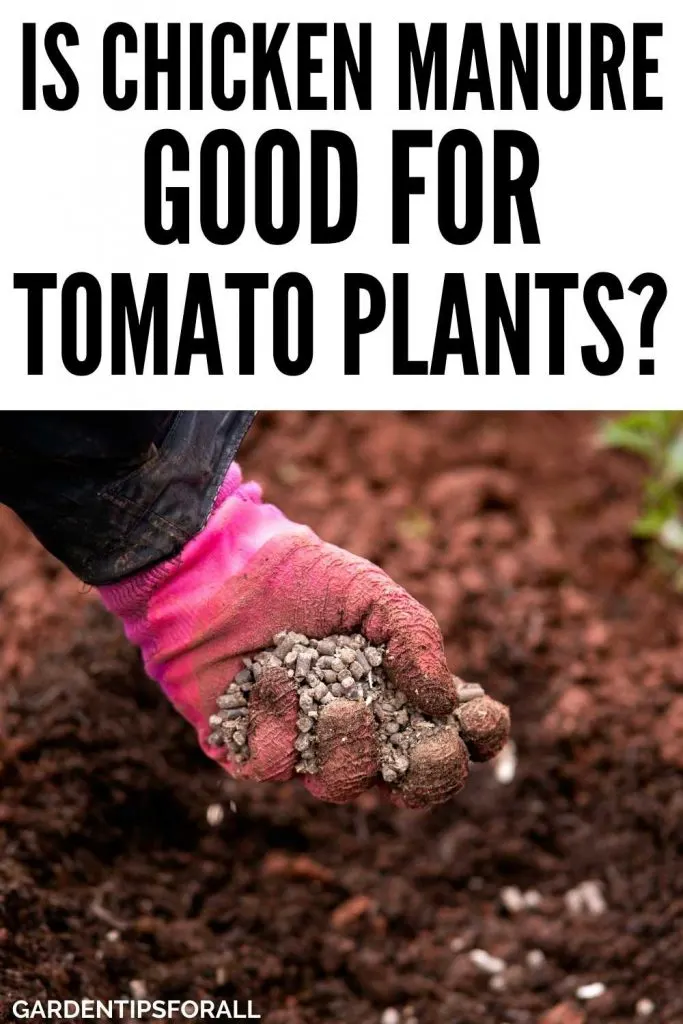Is Chicken Manure Good for Tomatoes?
Chicken manure is one of the most sort after manures for veggies. It’s easily accessible, easy to use, and does wonders to both the plants’ foliage and fruits.
But is chicken manure good for tomatoes?

Chicken manure is good for tomatoes. In fact, it is one of the best fertilizers you can use for tomato plants because it has higher concentrations of Nitrogen than most animal manures. However, you have to compost it first before using it. The high concentration of Nitrogen makes it dangerous, and it may burn your plants when used fresh from the farm.
Please keep reading to find out more about chicken manure and the best ways to use it for your tomato plants.
Related Articles:
- Is Cow Manure Good for Tomato Plants?
- What is the Best Manure for Tomatoes?
- What is the Best Mulch for Tomatoes in Pots?
Handling Chicken Manure
Did you know that your mature chicken produces manure the size of 1 cubic foot in six months?
Unfortunately, you can’t use it directly in your garden. It needs proper preparation for it to be effective and safe for your plants,
So, below is how to compost chicken manure.
Gather all the Manure and Bedding
Usually, it’s a perfect idea to use bedding in the coop for dry cushion and avoid the bad smell. So, farmers use sawdust, straw, shavings, and dry leaves as their bedding.
Accumulate all the manure and bedding and dump it into a compost bin. The amount of bedding and waste will depend on the frequency of cleaning the coop.
Some farmers will do a daily clean, while others will wait until it accumulates.
Balance the Ratio
The perfect compost manure has a blend of carbon to nitrogen ratio of 30:1. Therefore make sure you achieve that ratio in the bedding and manure mixture.
The challenge, in this case, is that different beddings have different C:N ratios.
So, the balance will vary reliant on the type of bedding used; hence most farmers will use a ratio of 2:1 waste to bedding.
But because of the high Nitrogen levels in the fresh waste, it would be better to have a 1:1 of bedding to waste, but the 2:1 ratio would still work.
Follow the process below:
- While mixing the compost and bedding, make sure the materials are adequately wet.
- Leave the compost to heat up in the sun for three days at about 130-150 degrees F.
- Ensure that the temperatures do not exceed 160 degrees, as this will harm the useful microorganisms.
- Preferably, use a temperature gauge to monitor for the perfect balance.
Heating the pile helps in killing the pathogens.
Heat again: to make sure the heating process is even, stir the pile bringing out the center and turning it downside up. This will ensure that the unheated part will have a chance to heat up. Leave it outside for a period of 2-3 days.
Curing process:
- Check if the whole pile has evenly heated.
- Once you are satisfied with the results, cover the pile loosely.
- Let it cure for about 45-60 days. The final mixture should all be dark, crumbly, and smell like fresh soil.
Add to your garden: your compost is now ready to add to your flower or vegetable garden. You can choose to spread it on the soil or mix it with the soil.
When Should You Fertilize Tomatoes?
The best time to fertilize your tomatoes is before planting them. Revitalizing the soil before planting makes it ready with nutrients.
It is also a safety precaution not to burn the crops with manure. However, if the plants are already growing, you can use small amounts of compost.
The best approach would be to side-dress your vegetable garden monthly with a low or balanced Nitrogen fertilizer. The side effects of high Nitrogen are that the plant will grow more foliage than fruits.
The ideal time to fertilize your tomatoes is in the evening when the sun is not intense. You can also do it after rain or after watering your garden, especially when using chemical fertilizers.
Conversely, compost has no restrictions and is perfect any time you need to apply. Just spread it around the tomato plants lightly on the soil.
You may also want to read this article to find out the difference between compost and manure.
Benefits of Chicken Manure for Tomatoes
Composted chicken manure offers a slow-release foundation of macro-and micronutrients. These act as soil improvement. Compared to other manures, chicken manure and bedding have higher Nitrogen, potassium, calcium, and phosphorus levels.
The composted chicken manure is also rich in organic matter. And incorporating organic matter in the soil raises its water-holding ability. It also improves air-flow and drainage, reduces erosion and leaching, and generally improves a soil’s composition.
Moreover, organic matter is a source of food for soil microbes. These soil microbes increase natural soil variety, speeding up the breakdown of organic nutrients, making them more readily available to plants.
How Much Chicken Manure Should You Use on Your Tomato Plants?
Tomatoes often require a balanced ratio of Nitrogen, Phosphorous, and potassium. That’s why it’s always advisable to use fertilizers with a balanced ratio of all the nutrients or higher phosphorous concentrations.
Since chicken manure has higher concentrations of Nitrogen, you should apply it sparingly.
Generally, you should apply at least 45 pounds of chicken manure over 100 square feet annually. This makes it an economical option since you only need a few chickens to achieve this amount, and you’ll readily find farmers ready to sell chicken manure.
Health Risks of Chicken Manure
As much as chicken manure is perfect for your tomatoes, it has some risks you can’t ignore. Below are some of them.
Escherichia Coli
Escherichia coli (E. coli) reside in the intestines of animals, including hens and humans.
While this set of bacteria ensures a healthy intestinal tract, E. coli becomes harmful when spread in chicken stools.
Other types of E. coli generate a poison named Shiga toxin. Shiga-toxin also causes diseases. Everyone stands a risk of getting E. coli infections, but the young and elderly are at a higher risk.
E. coli infection symptoms vary from vomiting, diarrhea, stomach cramps, and even fever and blood in the stool. Moreover, symptoms start showing from 1-10 days after contracting the infection.
Those who take prompt medical action recover within a week, but severe E. coli infections can be fatal.
Salmonella Bacteria
Salmonellosis infection comes from Salmonella bacteria. Just like E. coli, Salmonella also lives in the chickens’ intestines through their droppings.
Symptoms of Salmonellosis include diarrhea, fever, and abdominal cramps. The symptoms usually begin as early as 12-72 hours after infection.
With the proper treatment, people get well within a week after starting treatment.
Cryptosporidium Infection
Cryptosporidiosis is an infection originating from the tiny cryptosporidium parasites. Chickens pass these parasites through their droppings after contracting them.
People will show symptoms within a week after being infected. The symptoms include loss of appetite, abdominal cramps, dehydration caused by extreme vomiting and diarrhea, nausea, fever, and even weight loss.
The recovery process is gradual and may even take a month.
Safety Tips
To be on the safe side of using chicken manure, follow the following tips.
- You should apply the compost as a follow-up after prior application in the fall season.
- Always wear gardening gloves when handling manure from preparation to application.
- Remember to always wash vegetables thoroughly before consumption or cooking.
- People who are vulnerable to foodborne illnesses should stay away from eating raw vegetables from gardens where manure has been applied. These may include the elderly, pregnant women, children, diabetics, AIDS patients, and those with cancer.
Conclusion
Whether you’re a poultry farmer or live close to poultry farms, chicken manure would be an excellent organic fertilizer for your tomatoes. And since you don’t need lots of it, it’s a cheaper way of growing healthy tomatoes. Just handle it with care because of the higher nitrogen levels and the higher presence of harmful bacteria.

